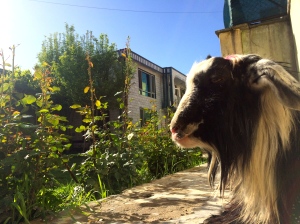ONLY IN AFGHANISTAN
There are so many misconceptions about life in Afghanistan. It is true, the Taliban are still here, there is widespread poverty and malnutrition, and the road to recovery from the past 30+ years of war is as pitted and potholed as the majority of our roads. It is also true that we have sustained multiple egregious attacks over the last two weeks, with more casualties than anyone can stomach.
However, there are also so many things that are so delightfully Afghantastic that could only happen here in Kabul:
Adventures in Kabul Airport:
Only in Afghanistan can you run in and out of immigration three times in one hour sans passport without getting into trouble. In fact, during my final, apologetic, sweaty exit from the departure gate through the passport hall, the officer said to me: “I don’t want to see you again. You know you’ve broken the law three times already, right?” Oops.
Camilo parenthesis:
We were driving to Le Jardin for a much-needed dinner of western food and exorbatently overpriced wine. In the midst of a deep conversation, Camilo announces, “Here is big parenthesis: I need to stop and buy two black socks. Right now.” We all laugh at this complete non-sequitor, but then Shabeer stops the car IN THE MIDDLE OF THE ROAD, jumps out, runs across the street, and returns three minute later with two pairs of black socks.
Nacho’s makeover:
I got a really nice tan a few Friday’s ago while… bathing and cutting the hair of my new baby goat. His name is Nacho, and his favorite food is everything that is not made of concrete or metal. I’m pretty sure his favorite activities are pooping everywhere, and ignoring the cat. All of my students and colleagues are shocked to learn that I do not plan to eat this goat, but that his main purposes are to keep our grass at an acceptable length (and destroy all flowers, vines, and other beautiful things), and to entertain his city-slicker owners.
Kabul Traffic:
Technically, University Road (that’s not its real name. in fact, this street has no name. none of them do.) is a four-lane street. Two eastbound, two westbound. However, during rush hour, which is every hour in which there is sunlight, it becomes seven lanes of absolute mayhem and arbitrary nonsense. The number of east or west-bound lanes is entirely dependent on the patience, or in most cases, lack thereof, of drivers. Wais, our personal king of the road, routinely forms his own impatience lane number eight, careening around anyone foolish enough to get in his way. He has actually driven the wrong way down access roads, between security bollards, whatever, in order to avoid sitting for too long (this is for security reasons, right?), or taking longer than he deems necessary to reach our destinations.
Hospitality:
Upon discovering that my housemates were out of town, Bibi, the indomitable matriarch of the massive family that lives next door (upon last count there were 15 adults), took it upon herself to feed me. We are talking mantou, ashak, lubia, naan baked in her own tandoor, sweets, and more visits than I, as a preferably solitary person, could handle in one weekend. She calls me her daughter, and regularly sends her actual daughters and grandchildren over to keep me company. When she can handle the walk (she is my mystic sister in Afghan foot breaking, and is currently hobbling around with a crutch, after being struck by a motorcycle), she herself comes over to sit in state over Casa Mexicana. People talk about Afghan hospitality, but I never truly understood it until now. I actaully sleep better at night now, knowing that I have such an incredible adopted mother looking out for me just next door! (In fact, while writing this, I was summoned outside to hold council with all of the next door ladies, who are literally shouting at me from their rooftop.)
Explosions of Roses:
Recently, the Taliban announced their “Spring Offensive,” which to me, honestly, sounds more like the start of baseball season than a reign of terror. The first few weeks were extremely quiet, but the city emerged from the miserable winter, exploding everywhere with…. Roses. The transformation of this dusty, brown, poop-filled metropolis into a lush green garden was shocking: medians, whose cracked dry dirt was formerly strewn with withering, barren trees, and junkies getting high under their filthy patos, now burst forth with roses of every color you could imagine. Where was once brown, there is now green and red and yellow and orange and pink. Even the harsh brown mountains that tower over the city are now a furry green. Kabul is BEAUTIFUL.
So, lest you be misled by the constant media reports of IED’s, suicide bombings, kidnappings etc, that Afghanistan is nothing but a lawless failed state, please understand that it is a place of constant delights and surprises, and the kindest and most welcoming people you could ever be so lucky to meet. Only in Afghanistan could you have such a juxtoposition of bad and good, barren and lush, chaos and convenience, desolation and beauty; but this is what gives me such hope for its future. Yes, we are in some of the lowest lows, however, in the midst of that you can still see the highest heights. Only in Afghanistan could such intense desperation give way to such intense hope.
